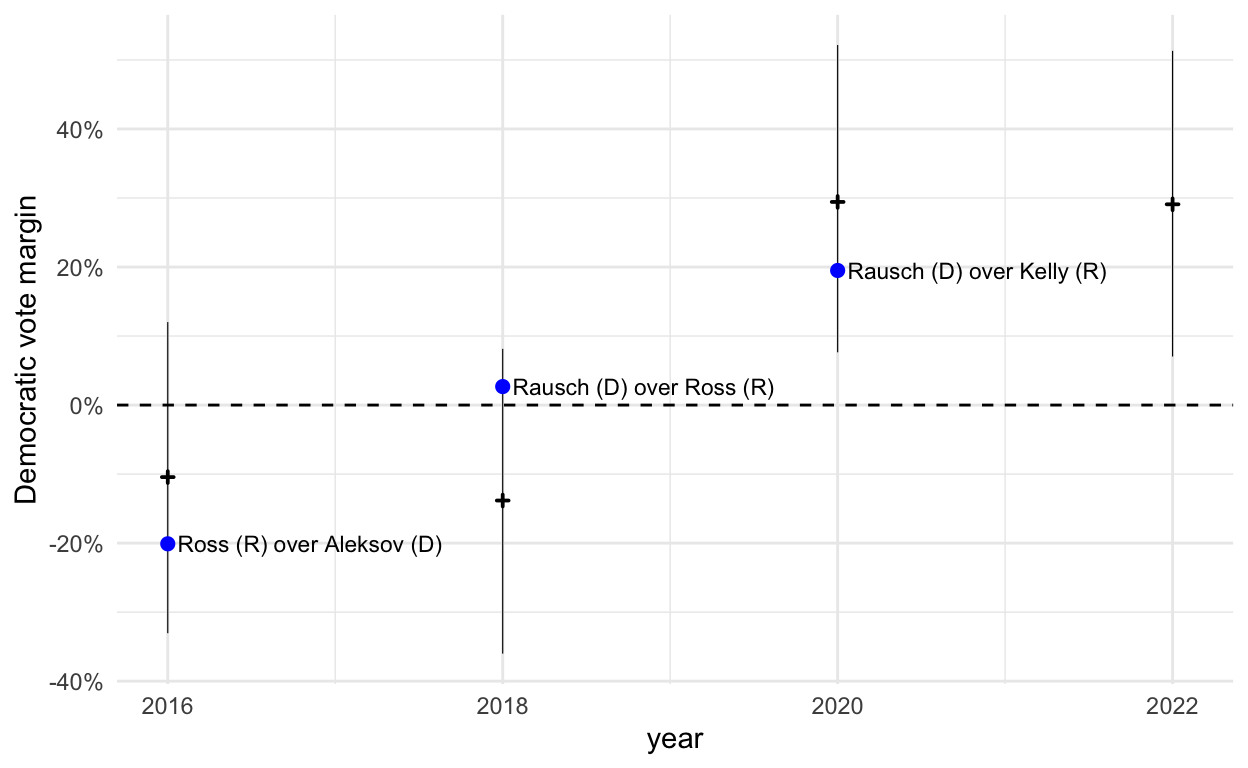There has been a great deal of interest in the MA State Senate race for the Norfolk, Worcester and Middlesex District with incumbent Senator Becca Rausch (D-Needham) and challenger State Representative Shawn Dooley (R-Norfolk). The previous version of this State Senate district—the Norfolk, Bristol and Middlesex—had been considered solidly Republican and was represented by Republican Richard Ross (R-Wrentham) who was ousted by Rausch in 2018, and represented by Scott Brown (R-Wrentham) before Brown was elected to the United States Senate in 2010.
Our simple, fundamentals-based model gives Rausch a very high probability of winning with a range of likely outcomes from a single digit Democratic margin to a major blowout. The major reason for this change in circumstances is a continual multi-year shift from Republican to Democratic strength in the affluent and well-educated Boston suburbs.
Regional Partisan Shifts
The rise of Donald Trump as the face of the Rebpulican party in the United States has led to a profound shift in levels of Democratic and Republican support in many areas of Massachusetts. This was evident after the 2016 presidential election as described in a thoughtful investigation by WGBH’s Adam Reilly supported by a Mass. Numbers analysis.
The process has continued with the 2020 election as well-educated and affluent suburbs have continued their move towards the Democratic Party and away from a Trump-led GOP. There has also been a shift in the rightward direction with much higher levels of support for Republicans in rural areas with more non-college voters and also in the gateway cities with large population of Hispanic (Lawrence) and Portugese (Fall River, New Bedford) voter ancestry.
Figure 1: State Senate partisan shifts 2012-2020
This map of partisan shift from 2012 to 2020 presidential elections by state senate district gives a strong picture of which areas are moving in the Democratic direction (affluent suburbs of Boston) and in the Republican direction (rural areas and gateway cities). Note that many of the gateway cities still vote in large majorities for Democrats, but the margins have come down significantly.
Impact of shifts on State Senate race
The pre-2021 Norfolk, Bristol and Middlesex State Senate District represented by Becca Rausch (D-Needham) is in second place behind the Third Middlesex District of Michael Barrett (D-Lexington), with respective shifts of 14 and 13 points in the Democratic direction between 2012 and 2020. However, the Third Middlesex District has gone from an already-very-blue 60% Democratic vote share to a much higher 74%, while the Rausch district was within Republican striking distance at 54% in 2012, but has moved to a 67% Democratic share in 2020.
These shifts often have important ramifications on the results of down-ballot state legislative races, which are reflected in our fundamentals-based model using the Partisan Voter Index (PVI) which is an average of the last two presidential races, adjusted by the nationwide result.
An examination of the model’s characterization of the races in the Norfolk, Bristol and Middlesex District for 2016, 2018, and 2020, and the similar Norfolk, Worcester and Middlesex District for 2022, show how the playing field has changed. The model’s adjustment for non-presidential years would have significantly reduced Senator Rausch’s chances in 2022 compared to 2020 if it had not been for the continuing shift of the region towards Democratic candidates in the 2020 election which raised the PVI from D+6 to D+12, giving Rausch about the same range of outcomes in 2022 as in 2020.

Figure 2: Norfolk, {Bristol, Worcester}, Middlesex model vs. outcome
| Norfolk, {Bristol, Worcester}, Middlsex model vs. outcome | |||||||
| year | incumbent | pres_year | candidates | result | pred_dem_margin | margin_low | margin_high |
|---|---|---|---|---|---|---|---|
| 2016 | GOP | TRUE | Ross (R) over Aleksov (D) | −20% | −10% | −33% | 12% |
| 2018 | GOP | FALSE | Rausch (D) over Ross (R) | 3% | −14% | −36% | 8% |
| 2020 | Dem | TRUE | Rausch (D) over Kelly (R) | 20% | 29% | 8% | 52% |
| 2022 | Dem | FALSE | Rausch (D) vs. Dooley (R) | 29% | 7% | 51% | |
While a win by State Representative Shawn Dooley (R-Norfolk) is not an impossible outcome, the profound shift of the Boston suburbs away from the Republican Party make a win by incumbent Becca Rausch much more likely.